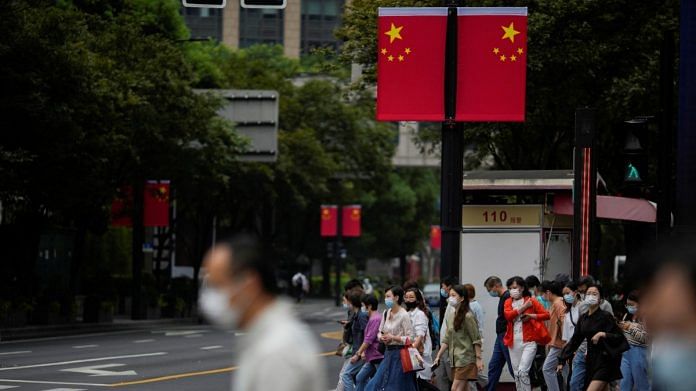New Delhi: Thirty months since World Health Organization declared the Covid outbreak as a pandemic and 21 months after the first vaccine was administered in China, Beijing still persists with a draconian ‘zero Covid’ policy despite critics saying that it has undercut the economy, caused hardships for citizens and baffled business leaders.
According to experts, the continuation of this policy is driven by several factors ranging from vaccine efficacy, limiting infection and mortality, bureaucratic control, and President Xi’s legitimacy before his imminent re-election for the third time at the 20th Congress of the Chinese Communist Party (CCP) in October.
“Several reasons underpin Beijing’s decision to stick to zero Covid. Firstly, the strategy was a major success early on, and President Xi Jinping praised it,” Professor M. Taylor Fravel of Massachusetts Institute of Technology tells ThePrint.
“Secondly, China’s vaccines remain less effective than those made outside. Thirdly, China’s hospitals lack the capacity to deal with a massive surge, while their elderly population remains resistant to vaccines. Therefore, they remain more cautious in dealing with the virus.”
Fravel explains that China seeks to maintain stability before any major political event, such as the CCP Congress, and in today’s context, it will involve preventing any disruptions through Covid outbreaks, which essentially means the continuation of ‘zero Covid’ and mass lockdowns.
Essentially, the policy entails a complete citywide lockdown anytime there is even a minute increase in Covid infections in a Chinese city. At times, restrictive measures were also extended to neighbouring areas.
For instance, nearly 26 million people were confined to their homes in Shanghai for over two months owing to an initial surge in infections in April. The stringent lockdown resulted in the curtailment of locals’ access to food and medicine, with reports even suggesting that some were turned away from hospitals while others suffered severe mental trauma.
Similar restrictions were enforced in August in Hebei province, the coastal city of Tianjin and in Shenzhen, which links Hong Kong to mainland China.
The lockdown in Shanghai and other areas over the spring and summer contributed to the stagnation of China’s economy which grew at just 0.4 per cent in the quarter ending June 2022 — its second-worst quarter in nearly 30 years. This fed the Chinese public’s growing disenchantment with ‘zero Covid’ and the regime.
However, Yanzhong Huang, a senior fellow at the New York-based think tank Council for Foreign Relations, argues that “public discontent [in China] is always fleeting”. According to Huang, China’s decision to stick with the ‘zero Covid policy’ is “governed by fidelity to party [CCP] policies rather than best public health practices”.
Also Read: China’s Golden Week holiday looks ‘gloomy’ amid growing Covid-19 concerns
Xi’s legitimacy
Explaining the optics of ‘zero Covid’, Bonnie Glaser, Director of the Asia Program at Washington-based think tank German Marshall Fund, tells ThePrint that “any surge with millions of Covid cases could become a national problem and raise issues of public support for President Xi and the Chinese Communist Party”.
But beyond concerns of public health and public support, the Chinese government’s persistence with the ‘zero Covid policy’ is linked to President Xi’s legitimacy in the run-up to the 20th Congress of the CCP.
“Any steep increase in cases or mortality would be bad for President Xi’s legitimacy. His legitimacy is even more important as the 20th Congress approaches,” says Chris Hughes, Emeritus Professor of International Relations at London School of Economics.
Adding that “changing track from zero Covid now seems unlikely”, Hughes says: “It would make political sense for Xi to stick with it and maintain his legitimacy till the CCP Congress is over. With winter approaching, we will probably only see a change in spring next year.”
Bureaucracy & corruption
Another layer to the perpetuation of ‘zero Covid’ is the enhanced control and power which bureaucrats and local administrations in China have gained over the last two years.
Earlier, civic administrations would be judged on a range of factors but now, only one metric matters — Covid control. To that effect, other civic responsibilities have taken a backseat ever since taming the virus became the top priority for local officials.
Referring to how local governments in China have been empowered to implement any means they deem fit to contain the virus, Zhuoran Li, a PhD candidate at Johns Hopkins, writes: “All localities implemented the zero-COVID policy to the extreme”.
Another key consideration is that most administrations are using up a majority of their resources and funds on Covid management which means that contracts for tracking, testing, especially PCR testing, and vaccinations are worth millions.
These contracts are being continuously handed out by the Chinese state with local administrations and bureaucrats authorised to release funds for these purposes. Since 2020, a system of patronage and corruption has emerged in China with multiple organisations having sprung up that solely deal in curbing Covid outbreaks.
As a result, vested interests in China are now lobbying for the perpetuation of the policy.
(Edited by Amrtansh Arora)
Also Read: Unfavourable views of China at ‘historic high’, global attitudes to Xi worsening, says Pew report



